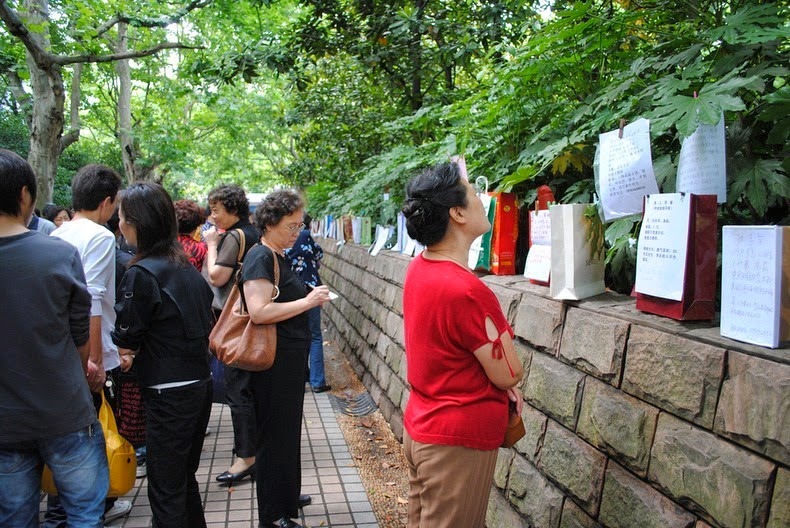Every Saturday and Sunday, between noon and five in the afternoon, regardless of the weather, the People's Park in Shanghai in China is crowded with parents of unmarried kids, who come to participate in the marriage market. On the walls of the avenues, hundreds of resumes and messages are hung by their parents, often without the knowledge of their children. On the resumes are written or printed the vital statistics of their offspring, the things that matter to the Chinese when seeking prospective brides or grooms for their children - height, age, income, education, Chinese zodiac sign, and whether they own a car or an apartment. The parents walk around chatting with other parents to see if there is a harmonious fit only after their children's standards are met. Shanghai marriage market is like online dating in a non-virtual setting, but some describe it as “a match.com meets farmers’ market”.
Although the right to choose your own spouse has long been established in China, Chinese parents still feel the need to try and set their children up, because they feel that their children are either too busy or are not actively looking. Traditionally, parents arranged their children's marriages. The first step is to establish contact between the parents on both sides, and if the parents agree to contact, then they will allow their children to go further. Many young people find the idea embarrassing, but for their parents, it is the last resort and the only way to uphold a traditional dating style for their children in modern China.
Marriage patterns have changed over the years in China. The young generation in the twenties and thirties are generally in less of a hurry to get married, for there are more pressing matters such as careers. Well-educated women in China have more options than women in past generations and are not afraid to put their career first. This change in marriage ideology puts the women in a higher position of power within a traditionally male-dominated society. This is compounded by the fact that the sex-ratio in China has remained abnormally askew for nearly three decades, following China's launch of its one-child policy, so much that a study predicts that by 2020, the country will have approximately 24 million unmarried men who cannot find wives. To give that figure some perspective, that’s more than the current female populations of Taiwan and South Korea combined.
But the tables could easily turn against the women. A local matchmaker at the Shanghai market muses, “Girls in Shanghai are strong these days. Although they don’t have as much trouble finding a man, there are still lots of unmarried girls’ names on my lists.”
The Shanghai marriage market is just one of several such open-sky marriage markets in China, and despite the thousands of parents that visit the market over a weekend, success rate remains low. Many parents have to return, month after month, year after year.






















Comments
Post a Comment